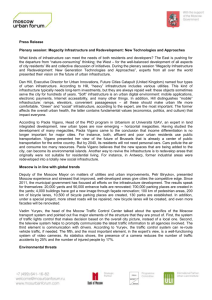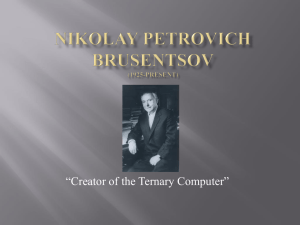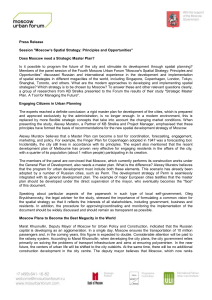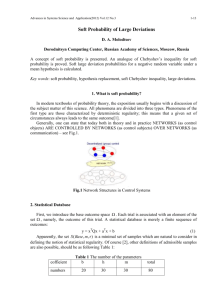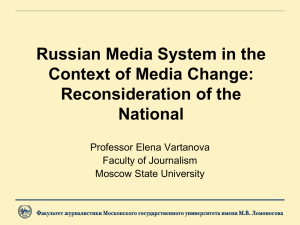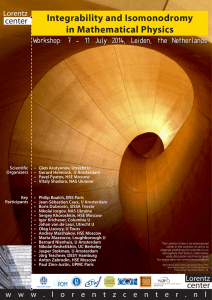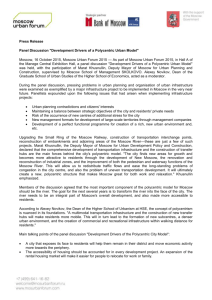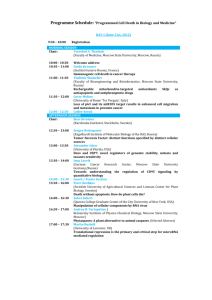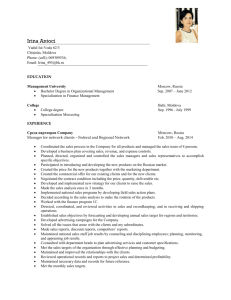Press Release
advertisement
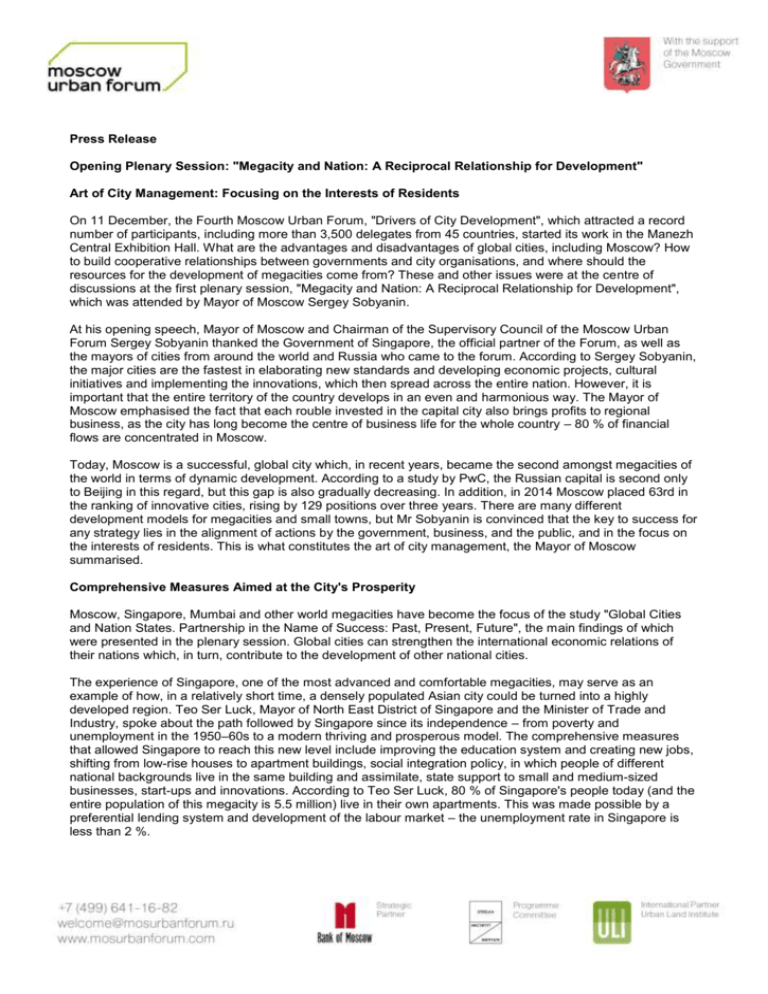
Press Release Opening Plenary Session: "Megacity and Nation: A Reciprocal Relationship for Development" Art of City Management: Focusing on the Interests of Residents On 11 December, the Fourth Moscow Urban Forum, "Drivers of City Development", which attracted a record number of participants, including more than 3,500 delegates from 45 countries, started its work in the Manezh Central Exhibition Hall. What are the advantages and disadvantages of global cities, including Moscow? How to build cooperative relationships between governments and city organisations, and where should the resources for the development of megacities come from? These and other issues were at the centre of discussions at the first plenary session, "Megacity and Nation: A Reciprocal Relationship for Development", which was attended by Mayor of Moscow Sergey Sobyanin. At his opening speech, Mayor of Moscow and Chairman of the Supervisory Council of the Moscow Urban Forum Sergey Sobyanin thanked the Government of Singapore, the official partner of the Forum, as well as the mayors of cities from around the world and Russia who came to the forum. According to Sergey Sobyanin, the major cities are the fastest in elaborating new standards and developing economic projects, cultural initiatives and implementing the innovations, which then spread across the entire nation. However, it is important that the entire territory of the country develops in an even and harmonious way. The Mayor of Moscow emphasised the fact that each rouble invested in the capital city also brings profits to regional business, as the city has long become the centre of business life for the whole country – 80 % of financial flows are concentrated in Moscow. Today, Moscow is a successful, global city which, in recent years, became the second amongst megacities of the world in terms of dynamic development. According to a study by PwC, the Russian capital is second only to Beijing in this regard, but this gap is also gradually decreasing. In addition, in 2014 Moscow placed 63rd in the ranking of innovative cities, rising by 129 positions over three years. There are many different development models for megacities and small towns, but Mr Sobyanin is convinced that the key to success for any strategy lies in the alignment of actions by the government, business, and the public, and in the focus on the interests of residents. This is what constitutes the art of city management, the Mayor of Moscow summarised. Comprehensive Measures Aimed at the City's Prosperity Moscow, Singapore, Mumbai and other world megacities have become the focus of the study "Global Cities and Nation States. Partnership in the Name of Success: Past, Present, Future", the main findings of which were presented in the plenary session. Global cities can strengthen the international economic relations of their nations which, in turn, contribute to the development of other national cities. The experience of Singapore, one of the most advanced and comfortable megacities, may serve as an example of how, in a relatively short time, a densely populated Asian city could be turned into a highly developed region. Teo Ser Luck, Mayor of North East District of Singapore and the Minister of Trade and Industry, spoke about the path followed by Singapore since its independence – from poverty and unemployment in the 1950–60s to a modern thriving and prosperous model. The comprehensive measures that allowed Singapore to reach this new level include improving the education system and creating new jobs, shifting from low-rise houses to apartment buildings, social integration policy, in which people of different national backgrounds live in the same building and assimilate, state support to small and medium-sized businesses, start-ups and innovations. According to Teo Ser Luck, 80 % of Singapore's people today (and the entire population of this megacity is 5.5 million) live in their own apartments. This was made possible by a preferential lending system and development of the labour market – the unemployment rate in Singapore is less than 2 %. Ron Huldai, the Mayor of Tel Aviv, is convinced that even a small city can compete on the global stage with megacities if it relies on innovation. He said that in spite of its modest size, Tel Aviv pays great deal of attention to the development of technology, as it has the highest density of start-ups in the world – 750 per square kilometre. "The city becomes attractive to creative people when they get a platform for development", said Ron Huldai. "Tel Aviv provides an attractive cultural and business environment by creating numerous coworking spaces. People are not afraid to start a business; they share their ideas". The heads of megacity administrations, such as Snehal Ambekar (Mumbai), Sukhumbhand Paribatra (Bangkok), Secretary for Development of Hong Kong Paul Chan, and Antanas Mockus, President of the Corpovisionarios Research and Advisory Centre for Urban Development and Mayor of Bogotá (1995–1997, 2001–2003) have shared their experiences in developing densely populated cities. These densely populated cities face similar problems. According to Sukhumbhand Paribatra, the Mayor of Bangkok, the development programme for this capital city has been in place for over 30 years. The authorities monitor the expectations of citizens and conduct studies, which reveal that the most pressing issues are transportation and communications, social welfare, housing policy, environment, and personal safety. "We rely more on our own resources rather than on the federal government. The amount of state support is declining. For example, while there was a three-fold increase in expenses, the state support remained on the same level", said Mr. Mayor. For her part, the Head of Mumbai City Administration noted that the government of India aims to develop the public transport system across the country, but many people continue to use their motorcycles without accepting the innovation. Paul Chan, Secretary for Development of Hong Kong, summed up the discussion: "In order to ensure the reciprocal relationship, we need to move not in one direction but in two. This is important not only for the city but for the nation as a whole". Moscow Competes with World Capitals As a global city and the face of Russia, Moscow needs support from the national economy. To retain its new global status and strengthen its reputation as a global city, Moscow will have to restructure its existing urban space, implement innovative projects, and ensure well-balanced development in all areas of New Moscow. Speaking at the meeting, Russian First Deputy Prime Minister Igor Shuvalov said that Moscow has experienced tremendous transformation over the twentieth century. In recent years, the Russian capital has become a completely different city, an international centre of gravity. We need to tolerate some temporary inconveniences, such as expansion of roads, infrastructure development, etc. The situation will change over time. Summing up the discussion, Sergey Sobyanin said that the development of human capital, ensuring a comfortable environment for people, high level of healthcare, education and social support, and wellestablished transportation infrastructure are the key areas of urban policy. The Mayor believes that the main thing is to find a compromise between rapid construction activity and the comfort of city residents. Moscow competes primarily with such cities as New York, London, Berlin, and Beijing. The challenge for Moscow, as a megacity, is to attract and retain global talent to make the city more competitive. The skilled experts who leave Moscow will also leave Russia. About the Moscow Urban Forum The Moscow Urban Forum has been held annually since 2011. It is an international conference dedicated to city development, architecture, economics and strategic planning of the cities. The Forum is held under the auspices of the Moscow Government, with the participation of Sergey Sobyanin, the Mayor of Moscow. The Urban Land Institute is the International Partner of the Forum. The Programme Directorate of the Forum is represented by Strelka Institute for Media, Architecture and Design. The Moscow Urban Forum is a platform for sharing experiences, where leaders of the largest cities in Russia and the world have an opportunity to discuss pressing issues and projects with representatives of the international expert community. Be the first to hear the news from the Forum: Forum website: http://mosurbanforum.ru/ Facebook: https://www.facebook.com/mosurbanforum Twitter: https://twitter.com/mosurbanforum Instagram: http://instagram.com/mosurbanforum Press Service Contact: +7 (495) 795-06-23 press@mosurbanforum.ru
